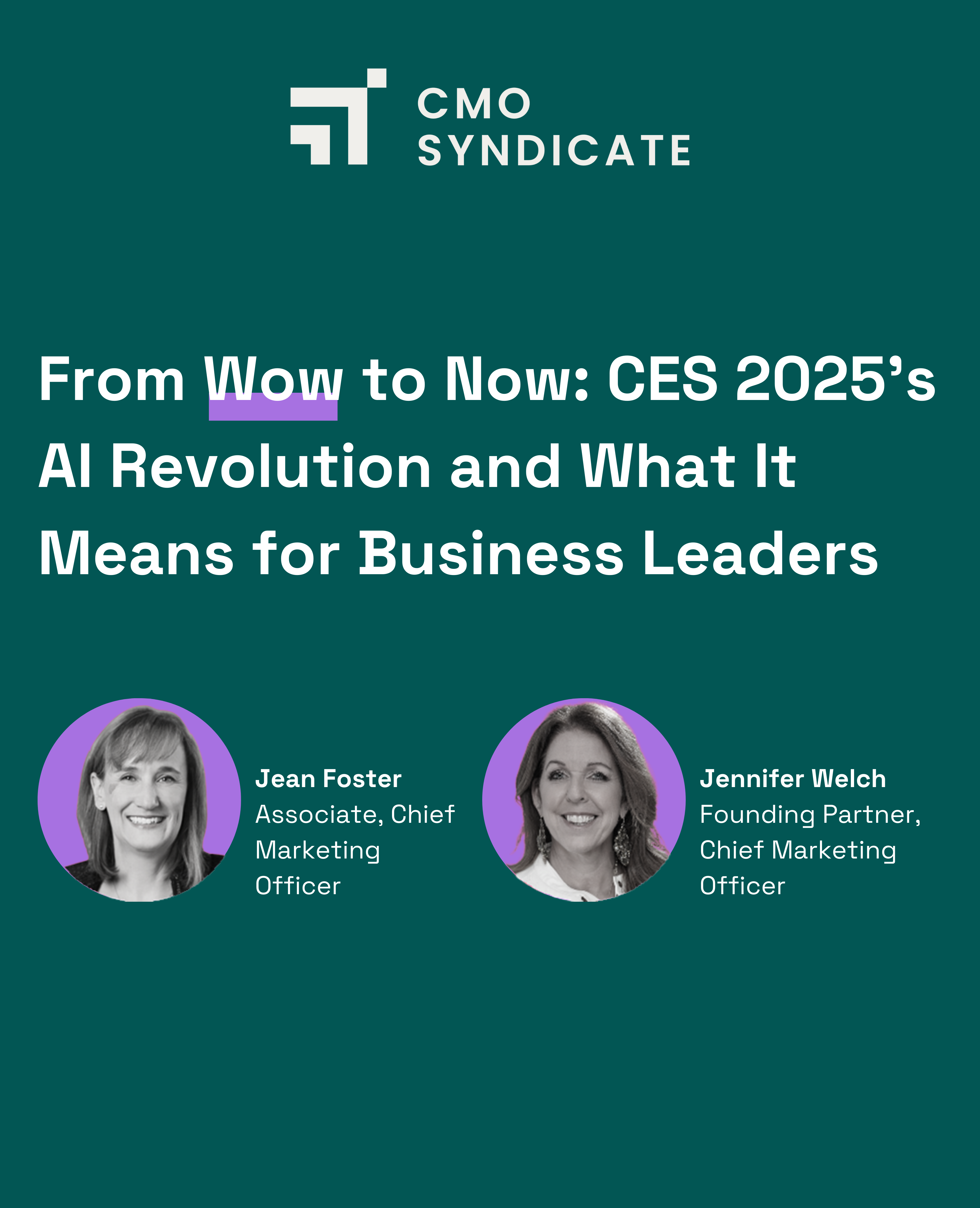From Wow to Now: CES 2025's AI Revolution and What It Means for Business Leaders
The Consumer Electronics Show (CES) 2025 was nothing short of transformative. For marketing leaders and business strategists, it was a window into the future of technology and its implications for industries worldwide. AI wasn’t just a theme—it was the theme. From AI-powered robotics to wearable tech, from digital health breakthroughs to sustainable innovations, CES 2025 made it clear: AI is no longer a futuristic concept but an integral part of business today.
The CMO Syndicate’s Jean Foster and Jennifer Welch attended CES 2025, bringing back invaluable insights. Jean, a veteran of CES with eight visits under her belt, guided first-time attendee Jennifer through the vast exhibition halls, showing her not only the “wow” moments but the practical applications of AI that are shaping business strategies today. This blog captures their key takeaways, from the biggest AI trends to actionable insights for leaders.
The CES 2025 Experience: A Marketer’s Perspective
Jennifer Welch’s first impression of CES was sheer awe at its scale and scope. "I knew this was going to be bigger than just a consumer gadget show," she remarked. But what she found was an unparalleled convergence of industries, from automotive to healthcare to retail, all leveraging AI to redefine customer experience, product innovation, and business efficiency.
Jean Foster, having spent years on the organizational side of CES, noted a distinct shift: "AI has been a theme for years, but this year it grew up. It’s no longer just about the wow factor; it’s about what’s happening now in the business world."
The Six Major AI Trends from CES 2025
1. AI is Everywhere—and It’s Practical Now
The buzz wasn’t just about AI’s capabilities but about how businesses are integrating it into daily operations. “Companies aren’t just talking about AI; they are embedding it into everything they do,” Jean observed. Whether it was AI-driven content creation, predictive analytics, or hyper-personalized marketing, AI has transitioned from experimental to essential.
2. AI-Powered Robotics: From Factory Floors to Social Interaction
CES 2025 showcased a new generation of robots. Industrial robots optimized logistics, while social robots aimed to improve elderly care and customer service. One standout was the companion robot designed for elder care, which interacted with attendees, demonstrating its ability to recognize faces and engage in meaningful conversation. “It was a little eerie,” Jean admitted, “but the potential for improving quality of life is undeniable.”
3. The Rise of Physical AI
AI’s next frontier, as discussed in Nvidia CEO Jensen Huang’s keynote, is Physical AI—the fusion of AI with real-world applications. “Physical AI isn’t just about robots; it’s about AI learning from and interacting with the physical environment,” Jean explained. From self-driving vehicles that understand road conditions in real-time to smart factories that optimize workflows autonomously, Physical AI represents the next phase of AI’s evolution.
4. Wearables & Digital Health: AI-Powered Personalization
Wearable technology took center stage with AI-driven health monitoring. Devices now track vitals like blood sugar levels, stress patterns, and even sleep cycles with near-clinical precision. "For caregivers and patients alike, this means proactive healthcare rather than reactive," Jennifer pointed out.
5. Sustainability & Green Tech: AI’s Role in a Greener Future
AI is also driving sustainability efforts. Companies are leveraging AI to reduce waste, optimize energy use, and even enhance agricultural productivity. John Deere’s latest AI-powered tractors, for instance, help farmers use less water and fertilizer while increasing yields. “Farming has always been a tough business,” Jennifer noted. “AI is making it more efficient and resilient.”
6. The Future of Smart Glasses & AI Assistants
AI-powered smart glasses promise a new level of productivity. Companies showcased prototypes that act as real-time meeting assistants, summarizing discussions, translating languages, and even providing contextual information. "Imagine being in a meeting where your glasses summarize key points as they happen," Jean said. “This is the future of work.”
What This Means for Leaders
1. AI is No Longer Optional
AI is transforming every aspect of business, from marketing automation to customer insights. Companies that fail to integrate AI risk being outpaced by competitors. “This isn’t just about cost-cutting; it’s about staying ahead of the curve,” Jean emphasized.
2. Marketing is Becoming Hyper-Personalized
With AI’s ability to analyze vast amounts of customer data, brands can deliver personalized experiences at scale. “The companies winning today are the ones using AI to understand their customers better than ever before,” Jennifer said.
3. AI is Redefining Customer Experience
From AI-powered chatbots to predictive analytics, customer interactions are becoming smarter and more seamless. “The best brands aren’t just selling products; they’re creating AI-driven experiences that customers value,” Jean added.
4. Competitive Disruption is Inevitable
Companies that adopt AI aggressively will leapfrog their competition. Those that hesitate risk irrelevance. “We’re seeing new players enter industries and disrupt established businesses overnight,” Jennifer warned.
Final Thoughts: The AI-Driven Future is Here
The overarching message from CES 2025 was clear: AI is now a business imperative. Whether through automation, personalization, or innovation, companies that leverage AI will drive growth and efficiency. Leaders must not only understand these trends but actively integrate AI into their strategies.
Jean and Jennifer’s key takeaway? “CES 2025 wasn’t just a tech show. It was a glimpse into the AI-driven future of business. The companies that embrace AI now will define the market landscape in the coming years.”
Stay Connected
For more insights from The CMO Syndicate, follow us on LinkedIn and stay tuned for upcoming webinars on marketing innovation, AI adoption, and industry disruptions.
If you have not already, you can view the video of the discussion, here.


Leave A Reply